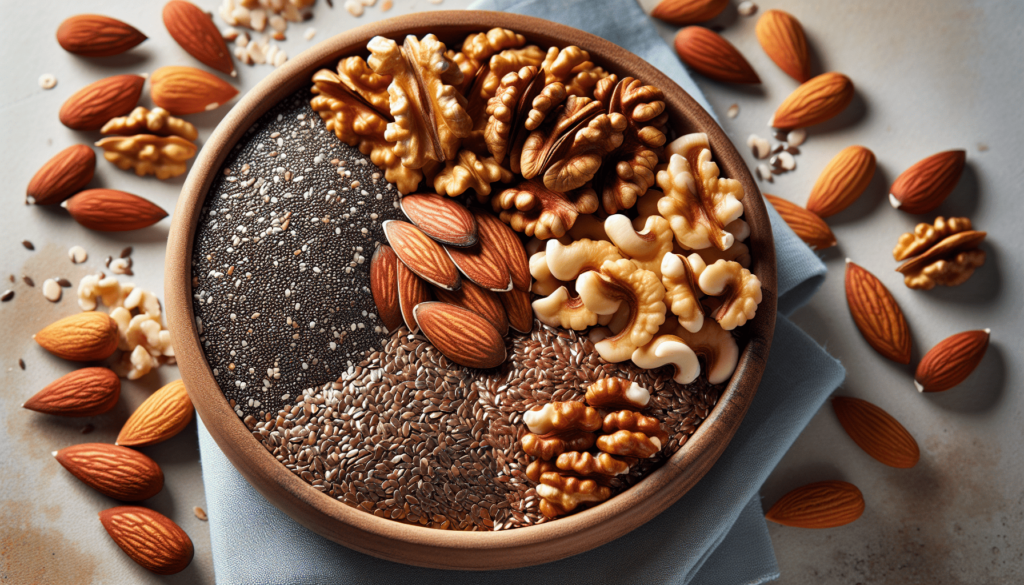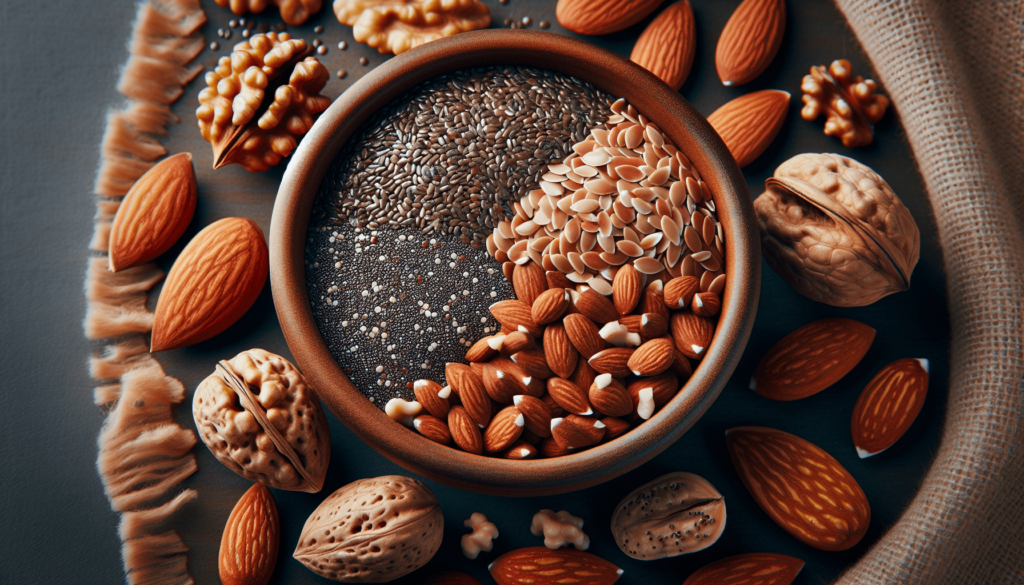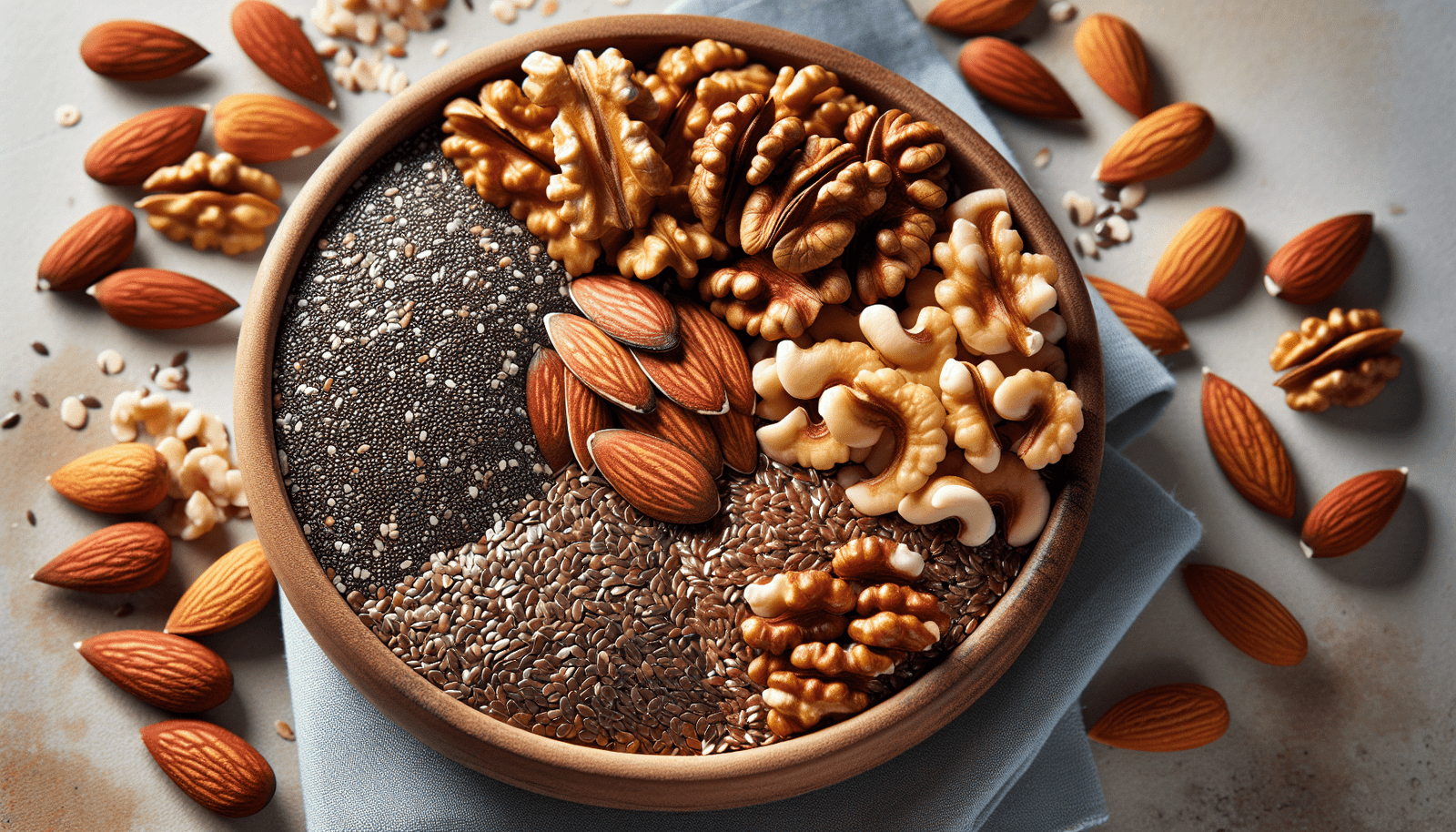If you’re looking to improve your gut health, then knowing which nuts and seeds are high in soluble fiber is key. Soluble fiber plays a crucial role in promoting healthy digestion and maintaining a balanced gut microbiome. In this article, we’ll explore some of the top nuts and seeds that are rich in soluble fiber, and discover the many benefits they have on your overall gut health. So get ready to enhance your diet with these delicious and nutritious additions!
Almonds
Almonds are high in soluble fiber
Almonds are not only a delicious snack, but they also offer numerous health benefits, particularly when it comes to gut health. One of the key reasons almonds are beneficial for your gut is because they are high in soluble fiber. Soluble fiber is a type of fiber that dissolves in water, forming a gel-like substance in your digestive system. This gel-like substance helps to soften and add bulk to your stools, making them easier to pass through your intestines.
Soluble fiber in almonds promotes a healthy gut
The soluble fiber found in almonds plays a crucial role in maintaining a healthy gut. When you consume almonds, the soluble fiber passes through your digestive system intact until it reaches your large intestine. Once it reaches the large intestine, the soluble fiber is fermented by the beneficial bacteria in your gut. This fermentation process produces short-chain fatty acids, such as butyrate, which are essential for maintaining a healthy gut environment.
Almonds can help prevent constipation
If you’ve ever experienced constipation, you know how uncomfortable and frustrating it can be. Luckily, almonds can help prevent constipation due to their high soluble fiber content. Soluble fiber adds bulk to your stool and softens it, making it easier to pass through your intestines. This can help alleviate constipation and promote regular bowel movements, ensuring that waste is eliminated from your body efficiently.
Almonds support the growth of beneficial gut bacteria
A healthy gut is home to trillions of bacteria, both good and bad. The balance of these bacteria is crucial for maintaining optimal gut health. The soluble fiber in almonds serves as a prebiotic, which means it acts as food for the beneficial bacteria in your gut. By nourishing these bacteria, almonds support their growth and proliferation, helping to maintain a diverse and healthy gut microbiome. A balanced gut microbiome is linked to various health benefits, such as improved digestion, enhanced immune function, and even positive effects on mental health.
Chia Seeds
Chia seeds are rich in soluble fiber
Chia seeds have gained popularity in recent years due to their impressive nutritional profile, and their high soluble fiber content is one of the reasons they are so beneficial for gut health. Soluble fiber is essential for a healthy gut as it promotes proper digestion and helps to regulate bowel movements.
Soluble fiber in chia seeds aids digestion
Chia seeds are packed with soluble fiber, which aids digestion by adding bulk to your stool and promoting regular bowel movements. When consumed, the soluble fiber in chia seeds absorbs water and swells, creating a gel-like substance in your digestive system. This gel-like substance helps to soften your stool and moves it through your intestines more easily, preventing constipation and promoting healthy digestion.
Chia seeds help regulate bowel movements
If you struggle with irregular bowel movements or occasional constipation, incorporating chia seeds into your diet can help regulate your bowel movements. The soluble fiber in chia seeds acts as nature’s gentle laxative, helping to soften and add bulk to your stool. This can alleviate constipation and ensure that waste is eliminated from your body regularly.
Chia seeds promote a healthy gut microbiome
Maintaining a healthy gut microbiome is crucial for overall well-being, and chia seeds can contribute to its health. The soluble fiber in chia seeds serves as a source of food for the beneficial bacteria in your gut, allowing them to thrive and maintain a diverse microbiome. A diverse gut microbiome has been linked to improved digestion, enhanced immune function, and even a reduced risk of certain diseases. By including chia seeds in your diet, you can support the growth and diversity of your gut bacteria, promoting optimal gut health.

Flaxseeds
Flaxseeds contain soluble fiber
Flaxseeds, also known as linseeds, are small seeds with a big impact on your gut health. One of the reasons why flaxseeds are considered a gut-friendly food is their remarkable soluble fiber content. Soluble fiber is a type of fiber that dissolves in water, forming a gel-like substance in your digestive system. This gel-like substance plays a crucial role in supporting your gut health.
Soluble fiber in flaxseeds improves gut health
The soluble fiber found in flaxseeds is essential for maintaining a healthy gut. When consumed, the soluble fiber passes through your digestive system intact until it reaches your large intestine. Once in the large intestine, the soluble fiber is fermented by the beneficial bacteria in your gut. This fermentation process produces short-chain fatty acids, such as butyrate, which are essential for nourishing the cells of your intestinal lining and supporting a healthy gut environment.
Flaxseeds can relieve constipation
If you’re looking for a natural remedy to alleviate constipation, flaxseeds may be just what you need. The soluble fiber in flaxseeds adds bulk to your stool and helps to soften it, making it easier to pass through your intestines. By incorporating flaxseeds into your diet, you can promote regular bowel movements and prevent the discomfort and frustration that constipation can bring.
Flaxseeds support the growth of beneficial bacteria
A healthy gut is teeming with beneficial bacteria that play a crucial role in maintaining optimal gut health. Flaxseeds can help support the growth of these beneficial bacteria by acting as a prebiotic. Prebiotics are compounds that provide nourishment for the beneficial bacteria in your gut, allowing them to thrive and flourish. By incorporating flaxseeds into your diet, you can support the growth of these beneficial bacteria, promoting a diverse and healthy gut microbiome.
Psyllium Husk
Psyllium husk is a good source of soluble fiber
One of the best sources of soluble fiber for your gut health comes in the form of psyllium husk. Psyllium husk is derived from the seeds of the Plantago ovata plant, and it is widely used as a natural remedy for constipation and to promote overall gut health.
Soluble fiber in psyllium husk promotes gut health
Psyllium husk is packed with soluble fiber, which plays a crucial role in promoting a healthy gut. When you consume psyllium husk, the soluble fiber passes through your digestive system intact until it reaches your large intestine. Once in the large intestine, the soluble fiber is fermented by the beneficial bacteria present, leading to the production of short-chain fatty acids like butyrate. These fatty acids are vital for maintaining a healthy gut environment and nourishing the cells of your intestinal lining.
Psyllium husk aids in regular bowel movements
One of the key benefits of psyllium husk is its ability to aid in regular bowel movements. The soluble fiber in psyllium husk absorbs water and swells, creating a gel-like substance in your digestive system. This gel-like substance helps to soften and add bulk to your stool, making it easier to pass through your intestines. By incorporating psyllium husk into your diet, you can help alleviate constipation and promote regular bowel movements.
Psyllium husk acts as a prebiotic for beneficial gut bacteria
Maintaining a healthy balance of gut bacteria is crucial for optimal gut health. Psyllium husk acts as a prebiotic, providing nourishment for the beneficial bacteria in your gut. This helps to support their growth and proliferation, allowing them to thrive and maintain a diverse and healthy gut microbiome. By including psyllium husk in your diet, you can promote the growth of beneficial gut bacteria, which in turn can have a positive impact on your overall well-being.


